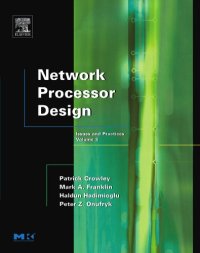
Ebook: Network Processor Design, Volume 3: Issues and Practices
- Genre: Computers
- Tags: Certification, Adobe, Cisco, CompTIA, Linux, Microsoft, Oracle, Security, Computers & Technology, Computer Design, Microprocessors & System Design, Hardware & DIY, Computers & Technology, Microprocessor Design, Microprocessors & System Design, Hardware & DIY, Computers & Technology, Design & Architecture, Hardware & DIY, Computers & Technology, Networks, Networks Protocols & APIs, Networking & Cloud Computing, Computers & Technology, Electrical & Electronics, Circuits, Digital Design, Electric Machinery & Motors, Electron
- Series: The Morgan Kaufmann Series in Computer Architecture and Design
- Year: 2005
- Publisher: Morgan Kaufmann
- Edition: 1
- Language: English
- pdf
Through chapters on hardware, software, performance and modeling, Volume 3 illustrates the potential for new NP applications, helping to lay a theoretical foundation for the architecture, evaluation, and programming of networking processors.
Like Volume 2 of the series, Volume 3 further shifts the focus from achieving higher levels of packet processing performance to addressing other critical factors such as ease of programming, application developments, power, and performance prediction. In addition, Volume 3 emphasizes forward-looking, leading-edge research in the areas of architecture, tools and techniques, and applications such as high-speed intrusion detection and prevention system design, and the implementation of new interconnect standards.
*Investigates current applications of network processor technology at Intel; Infineon Technologies; and NetModule.
Presents current research in network processor design in three distinct areas:
*Architecture at Washington University, St. Louis; Oregon Health and Science University; University of Georgia; and North Carolina State University.
*Tools and Techniques at University of Texas, Austin; Academy of Sciences, China; University of Paderborn, Germany; and University of Massachusetts, Amherst.
*Applications at University of California, Berkeley; Universidad Complutense de Madrid, Spain; ETH Zurich, Switzerland; Georgia Institute of Technology; Vrije Universiteit, the Netherlands; and Universiteit Leiden, the Netherlands.
As the demand for digital communication networks has increased, so have the challenges in network component design. To meet ever-escalating performance, flexibility, and economy requirements, the networking industry has opted to build products around network processors. These new chips range from task-specific processors, such as classification and encryption engines, to more general-purpose packet or communications processors. Programmable yet application-specific, their designs are tailored to efficiently implement communications applications such as routing, protocol analysis, voice and data convergence, firewalls, VPNs, and QoS.
Network processor design is an emerging field with issues and opportunities both numerous and formidable. To help meet this challenge, the editors of this volume created the first Workshop on Network Processors, a forum for scientists and engineers from academia and industry to discuss their latest research in the architecture, design, programming, and use of these devices. In addition to including the results of the Workshop in this volume, the editors also present specially commissioned material from practicing designers, who discuss their companies' latest network processors. Network Processor Design: Issues and Practices is an essential reference on network processors for graduate students, researchers, and practicing designers. * Includes contributions from major academic and industrial research labs including Aachen University of Technology; Cisco Systems; Infineon Technologies; Intel Corp.; North Carolina State University; Swiss Federal Institute of Technology; University of California, Berkeley; University of Dortmund; University of Washington; and Washington University. * Examines the latest network processors from Agere Systems, Cisco, IBM, Intel, Motorola, Sierra Inc., and TranSwitch.